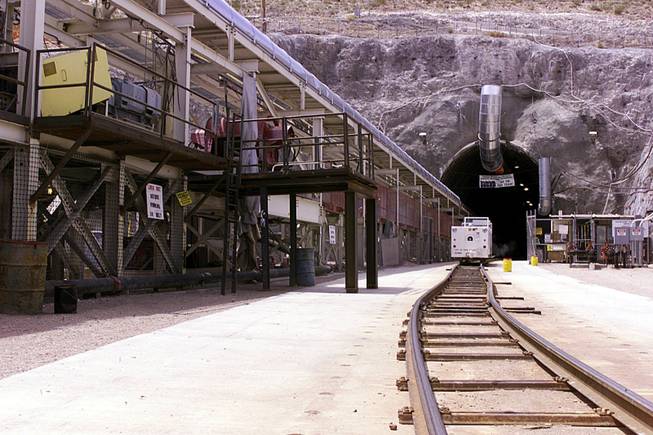
File photo
Yucca Mountain is located about 90 miles northwest of Las Vegas.
Friday, Nov. 7, 2014 | 2 a.m.
Sen. Harry Reid is undeniably the nation's staunchest opponent of bringing the nation's nuclear waste to Yucca Mountain.
But Republicans' overwhelming sweep in Tuesday's elections may have made things more difficult for Nevada's senior senator.
He's no longer the majority leader of the U.S. Senate, able to stop the bill from getting a vote. And not every member of Nevada's newest delegation to Congress opposes the Yucca plan.
Here's what you need to know about what the 2014 election means for Yucca.
The background
Lawmakers of both parties in Congress would like to see the nation's spent nuclear fuel sitting at decommissioned reactors in their backyards shipped and buried in Yucca Mountain. After all, Congress and President Ronald Reagan approved the site about 90 miles north of Las Vegas in a 1987 bill. Reid and other Nevada officials spurned the legislation as the "screw Nevada" bill.
In 2002, a Republican Congress again agreed to push forward with the proposal. It was a proposition Reid, then in the minority, attempted to fight.
That changed when Democrats took the Senate in 2006 and Reid became the majority leader. Since then, he's single-handedly stopped all pro-Yucca bills at the Senate door. In case that didn't work, he also made sure to bring on a powerful ally in President Barack Obama, who has said he'd veto any spending bill that funds Yucca Mountain.
The government has spent $15 billion developing Yucca, and the Nuclear Regulatory Commission has about $7 million in its nuclear waste fund as of August. Much of that is expected to help study the project's safety, according to agency chairwoman Allison Macfarlane.
The shift in power
But when the new Congress starts up in January, Reid will no longer be the majority leader. Instead, he'll face a Republican Senate and a Republican House of Representatives that very much would like to fund the Yucca project. The Republican-controlled House passed a spending bill in July that contains money to move forward with Yucca.
Reid will still be able to use parliamentary procedures to slow down or block the bill entirely, say Nevada political insiders. The worst-case scenario would be a bill that gets through Congress but stops at Obama's desk. (A post-election public feud between Reid's chief of staff and top Obama aides this week shouldn't change Yucca's future.)
Another wrinkle in Reid's plan
But a Republican Congress isn't the only challenge Reid faces.
Nevada's newest member to Congress, Assemblyman Cresent Hardy, is on record supporting the Yucca project. The 4th Congressional District, which elected Hardy on Tuesday, encompasses Nye County and the site of the proposed project.
Hardy said in an April primary debate he's in favor of moving forward on Yucca, so long as it can be done safely. And on Thursday, Nye County Commissioner Dan Schinhofen told KNPR he believes he has Hardy's support for the plan.
Until now, Nevada's congressional delegation has unanimously opposed the project. Outgoing Rep. Steven Horsford, a Democrat who lost to Hardy, railed against it while in Congress, despite some people in the rural part of the district who were optimistic about the jobs the plan might bring.
When the new Congress starts up in 2015, a divided Nevada delegation on Yucca will make things that much tougher for Reid.
What's next?
There's a good chance it will move forward in the next few months.
In October, amid the heat of the elections, the federal agency in charge of Yucca Mountain released a long-awaited report confirming the site as a safe spot.
The Nuclear Regulatory Commission's findings will give Republicans in Congress even more momentum to push a bill through restarting the project. They could start debating it as soon as this fall during the lame duck session of Congress. That's when Congress must pass spending bills to keep the federal government open.
All of this presents a challenge for Reid, who will have to find a way to stop the plan without the full support of Congress or even his delegation.

Join the Discussion:
Check this out for a full explanation of our conversion to the LiveFyre commenting system and instructions on how to sign up for an account.
Full comments policy